- What is mathematical biology?
- Training in mathematics
- Financial support
- How do I apply?
- Current graduate students interested in mathematical biology
The research faculty in mathematical biology is very interested in training Ph.D students. For that purpose they have received a large Research Training Grant from the National Science Foundation. This grant provides academic year stipends so that graduate students studying mathematical biology have reduced teaching responsibilities and the grant also provides summer stipends. The Director of the Research Training Grant is Michael Reed and the Assistant Director is Anita Layton.
The program in mathematical biology is part of the Graduate Program of the Mathematics Department. Students apply to become graduate students in the Mathematics Department, indicating their interest in mathematical biology in their applications. When they complete the requirements of the program, they receive the Ph.D. in Mathematics.
What is mathematical biology?
The faculty takes a very broad view of the field of mathematical biology and the training of graduate students. In their thesis research, students can:
Many mathematical biology faculty members are both pure and applied mathematicians, and thus they are well qualified to advise students and help them formulate a program of study based on their own interests. The breadth of research topics can be seen on the list of current graduate students interested in mathematical biology. |
This video is taken from a 16-mm movie made in the 1950s by the late David Rogers. It depicts a human polymorphonuclear leukocyte (neutrophil) on a blood film crawling among red blood cells. The neutrophil is "chasing" Staphylococcus aureus microorganisms.
|
Training in Mathematics.
The faculty believes that all graduate students in mathematical biology should have excellent training in core mathematics. Thus each student should take a variety of graduate courses during their first two years selected from some of the following fields, analysis, dynamical systems, partial differential equations, probability, algebra, geometry, topology, statistics, discrete mathematics, depending on the student's particular interests. All students interested in mathematical biology should take Math 387, offered in Spring, twice.Mathematics 387. Current Research in Mathematical Biology. This course will consist of rotating sets of three minicourses each taught by a different faculty member. Different topics will be covered in different years and students may take the course twice. Topics will be drawn from: probability theory and genomics, mathematical methods in biochemistry and cell biology, applications of topology and geometry to genomics and protein folding, heart physiology and mathematical issues in cardiac arrhythmias, biofluid mechanics, mathematical methods in kidney function, mathematical questions in image reconstruction, analysis of large data sets, and the evolution of viruses.
In Spring 2011, Math 387 will be taught by:
- Rick Durrett: Probabilistic Methods in Genomics and Cancer Modeling.
- Michael Reed: Mathematical Insights into the Biology of Cells.
- John Harer: Geometric and Topological Methods in Biological Networks.
Training in Biology. The amount of training in biology that is appropriate depends on whether the student's research plan is in area (1), (2), or (3) indicated above under What is Mathematical Biology?. Students may, if they wish, take courses in a very large number of different departments and schools (see The Duke Environment).
Students supported by the Research Training Grant will normally do a project with a biologist in the summer after their second year of graduate study. Projects will be arranged by the the Director, Michael Reed, and the the members of the Biology Advisory Committee, a group of distinguished biologists at Duke. Students can be supported more than once (and earlier in their careers) if appropriate to their interests.
Responsibilities of RTG students. Graduate students supported by the Research Training Grant benefit because they have fewer teaching responsibilities and therefore can concentrate on their research program. They do have some other responsibilities, however. The RTG grant has a large number of stipends to support undergraduate research projects in mathematical biology. RTG graduate students will sometimes be asked to help faculty members mentor these projects. Each year, the TG faculty will hold a 10 day workshop in May for students from small colleges in the southeast to tell them about mathematical biology and to encourage them to go to graduate school. RTG students will occasionally be asked to assist with the workshop.
Training in Teaching and Presentation Skills. All mathematical biology students must participate in the teacher-training program of the Mathematics Department. Jack Bookman, who developed this pioneering program at Duke, helps graduate students become excellent teachers. Students also receive training in in delivering research lectures and grant writing. Excellent presentation skills are particularly important for mathematical biologists who often have to give lectures to mathematicians who know little biology or to biologists who know little mathematics.
Mentoring and Advising. All students entering the graduate program of the Mathematics Department are assigned a faculty mentor who helps them with course selection and discusses with them their career goals. Once the graduate student selects a thesis advisor these duties are taken on by the advisor. All graduate students interested in mathematical biology will be assigned a mentor who does research in mathematical biology.
Talk to Current Students. Prospective graduate students can find out what our current students think about mathematics training, teacher-training, biology training, mentoring and advising, and the atmosphere in the Department. Simply consult the list of current students interested in mathematical biology and send emails.
Financial Support.
All students admitted to the Ph.D. program in mathematics are guaranteed five years of financial support, assuming that they make satisfactory progress towards the degree. The Research Training Grant provides student funding in the form of research assistantships (open to US Citizens and permanent residents) for students pursuing research in mathematical biology. Additional (unrestricted) student support is available through fellowships, faculty research grants and departmental teaching assistantships.Thus all students, regardless of nationality, are encouraged to apply to study mathematical biology at Duke.What if I'm not sure? That is not unusual. Most students go to graduate school to earn the Ph. D. because they love mathematics, but very few know exactly what they want to work on. You may be driven to study pure mathematics or you may be excited by seeing mathematics in action in the real world, but you may be unsure whether you want to specialize in applications to economics, or biology, or physics, or computer science. That's fine.
During your first two years of graduate study you will take lots of courses, attend lots of seminars and talk to lots of mathematicians and mathematics graduate students. Because of this immersion, you will know much much more about mathematics and applied mathematics than you do now and you will choose what is right for you. You can decide as late as your third year that you want to do mathematical biology. Or, perhaps if you came to Duke intending to specialize in mathematical biology you will decide in your third year that you want to do something else. That's ok too. Such mid-course corrections are not unusual. Our faculty will help you to figure out what you want and then will help you achieve your career goals.
How do I apply?
This part is easy. You simply go to the application information for graduate study in mathematics at Duke, where you will find directions and a discussion of the admissions process and financial support. You can also email directly Michael Reed, Director of the Research Training Grant Program or Tom Witelski, Director of Graduate Studies.
Current Graduate Students Interested in Mathematical Biology
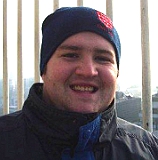
|
Matt Bowen
webpage Advisor: David Schaeffer "I am using analysis and computation to consider a PDE model for electrical cardiac activity. Under periodic stimulation of the model, different parameter values lead to qualitatively different long term behaviors. Similar behaviors have also been observed in stimulated cardiac tissue."
|
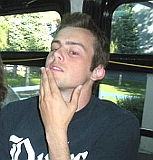
|
Miles Crosskey
webpage Advisor: Mauro Maggioni "I'm currently working with Mauro Maggioni on a project that uses diffusion maps for dimensionality reduction on molecular dynamics systems."
|
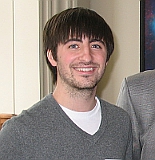
|
Jack Enyeart
webpage Advisor: Michael Reed "I'm interested in mathematical modeling of biological phenomena--particularly those that involve stochastic processes."
|
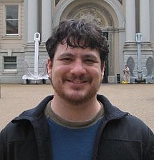
|
Kevin Gonzales
webpage Advisor: David Schaeffer "My current research focuses on building and analyzing a differential equationmodel that describes the cAMP-PKA pathway in Saccharomyces cervisiae (buddingyeast)."
|

|
Richard Hahn
webpage Advisor: Sayan Mukherjee "My research focuses on the notion of "borrowing information" in the context of Bayesian modeling, specifically high dimensional regression problems. A methodological theme that runs throughout my work is the use of latent variables as a tool for structuring scientific models. This work has motivating applications in areas from cancer genomics to behavioral economics."
|
|
|
Tyffany Kolba
webpage Advisor: Jonathan Mattingly "I study issues of stability for stochastic differential equations. Since randomness is inherently present in nature, many biological phenomena can be modelled using stochastic differential equations. A few of these biological phenomena which I am interested in are neuron firing, the spread of epidemics, and molecular motors."
|
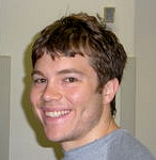
|
Sean Lawley
webpage Advisor: Michael Reed "I am currently developing a mathematical model of arsenic detoxification with Mike Reed and Fred Nijhout to study how nutritional supplements can increase arsenic detoxification in humans."
|
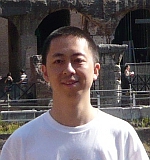
|
Yi Li
webpage Advisor: Anita Layton "I work on numerical methods for computing fluid motion driven by immersed interfaces."
|
|
|
Shishi Luo
webpage Advisor: Michael Reed "I work with the Koelle Lab (Biology department) on modelling rapidly evolving infectious diseases. Understanding the overall dynamics of such viruses requires interfacing disease dynamics, traditionally modeled by nonlinear systems of differential equations, with molecular sequence evolution, traditionally studied using the tools of population genetics."
|
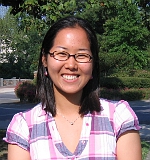
|
HwaYeon Ryu
webpage Advisor: Michael Reed "I am interested in probability closely related with PDE problem andbiology. Especially, I am trying to study how probability theory in thetheoretical sense could be used and applied in biology in order to explain"why and how" something happens."
|
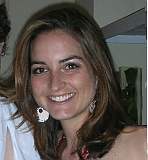
|
Sarah Schott
webpage Advisor: Mark Huber "I am interested in probability and Monte Carlo Methods, in particular. Monte Carlo algorithms have proven useful in the analysis of protein folding, phylogenetic trees and population genetic models."
|
|
|
Ioannis Sgouralis
webpage Advisor: Anita Layton "My interest is in Analysis and its applications, especially in Biology. Currently, I am working with Professors Anita Layton and Harold Layton on the renal physiology. I am developing new mathematical models and incorporating experiment data to study the myogenic response of the afferent arteriole."
|